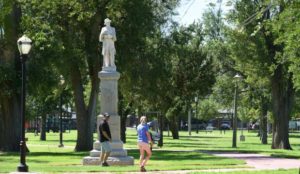I am delighted to see that Amarillo, Texas — my current city of residence — has entered a serious debate that many other communities have already joined.
How do we remember those who fought for the Confederate States of America? Should we remember them? Should we forsake them?
This is an important discussion that erupted in August as a riot ensued in Charlottesville, Va. White supremacists, Klansmen and neo-Nazis marched to protest a plan to remove a statue of Confederate Gen. Robert E. Lee from a public park. Counter protesters emerged to challenge the first group. A young woman was killed when she was run over by a car allegedly driven by a young man with white supremacists sympathies.
The debate hasn’t really let up since.
Now it’s arrived in Amarillo. On Monday, the Amarillo public school system is going to discuss whether to rename Robert E. Lee Elementary School. The Robert E. Lee school situation presents an amazing irony, given that the school is located in a historically black neighborhood. Think of that for a moment: That school is named to honor a man who fought to destroy the United States. And for what purpose? To preserve the enslavement of black Americans!
There’s more discussion about the status of a Confederate soldier statue at Ellwood Park.
A pro-Confederate advocate is urging the City Council to “leave history alone.”
I come at this from a different angle. I am a transplant who chose to move to Amarillo in early 1995. My wife and I came here from Beaumont, Texas, where we lived for nearly 11 years prior to moving to the Panhandle. Indeed, we have witnessed our fair share of racial strife since we moved to Texas in 1984 from Oregon, where I was born and where my wife lived for many years.
I see the Confederacy as an aftertaste of the nation’s bloodiest armed conflict. The Civil War killed more than 600,000 Americans. Why did they fight? The Confederacy came into being as a protest against federal policy that the Confederate States believed interfered with their own right of self-determination.
Let’s not be coy about what those states wanted to preserve: One of their goals was to maintain slavery.
They separated from the United States of America and then went to war. Where I come from, I consider that an act of treason.
Is that the history we want to preserve? Is that what we honor?
I don’t have any particular concern about those who plaster Confederate flags on their bumpers or fly the Stars and Bars from their car radio antennae. That’s their call. Do I question why they do these things? Sure, but I don’t obsess over it.
Putting these symbols, though, on public property — be they parks or public schools — is another matter.
Preserving and honoring history is fine. I’m all for it. The Civil War, though, represents a dark and grim chapter in our nation’s history that should be remembered, studied and discussed. But do we honor that time? That’s why we have historical museums. We’ve got a damn fine historical museum in Canyon, at the West Texas A&M University campus.
So, let’s have this discussion in Amarillo about the Confederacy. Keep it civil and high-minded.
